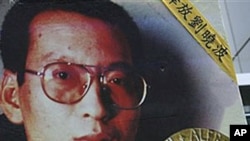The winner of this year's Nobel Peace Prize, imprisoned dissident writer Liu Xiaobo, has been a longtime advocate for greater political reform in China. The Chinese government considers Liu a criminal and is most incensed that from jail, he could still win such a prestigious international award. The government's anger means no one will be there to receive Liu's prize.
In 2006, dissident writer Liu Xiaobo called on writers around the world to pay greater attention to what he described as a lack of freedom for writing in China.
Four years later, although Liu is in jail and effectively silenced, he got his wish.
The Nobel Committee named him this year's peace laureate, which elevated his argument and the issue of China's human rights record to the top of worldwide concerns.
Liu says if the Chinese people have the support of the whole world, they can work together to change China from a totalitarian state to "a free nation," where each person can express him or herself freely.
Why he was imprisoned
A year ago, a Chinese court convicted Liu of subversion and sentenced him to 11 years in prison. He had disappeared into police custody a year earlier, in late 2008, shortly before the public release of Charter 08, a manifesto he helped organized that calls for freedom of expression and political reform in China. More than 300 Chinese people initially signed the document, which has now gained more than 10,000 signatures online.
Beijing has expressed its fury at the award going to someone it considers a criminal.
Foreign Ministry spokeswoman Jiang Yu indicated her government sees it as an insult to China's judicial independence and as interference in China's internal affairs.
Jiang accused the Nobel Committee of openly supporting criminal activity in China.
She also called the committee members "clowns" and accused them of "orchestrating an anti-China farce."
The spokeswoman says any attempt to"make an issue out of Liu Xiaobo," or to change China's political system or development path, will not succeed. She says China will never succumb to what she described as "coercive practices."
House arrest
The government reaction included putting Liu's wife, Liu Xia, under house arrest, even though she is not accused of committing a crime. His relatives have been blocked from leaving China, which means no one from his family will be able to go to Oslo to receive the award.
By tradition only the laureate or his family can accept the award.
Initially, Liu Xia was able to send out messages via the Internet.
She saw her husband after the announcement and said he dedicated the award to the "lost souls of June 4th," a reference to the hundreds of people killed when Chinese troops suppressed pro-democracy demonstrations in Tiananmen Square in June 1989. Liu Xiaobo had been active then, and spent time in jail following that crackdown.
Listed
Before her Internet was cut off, Liu Xia issued a list of names of more than 100 people she wanted to attend the Nobel ceremony to honor her husband.
Journalist Li Datong, who has often criticized the Chinese government for censorship and other issues, was on her list.
Li says although he has a passport and would have been honored attend on Liu Xiaobo's behalf, he cannot go.
Li says Chinese authorities are using the list like a tool, to determine which people to ban from leaving the country.
Another on the list, Dai Qing, was already overseas when the Nobel announcement was made. She initially planned to attend the ceremony, since she thought she was the only one able to go. But she changed her plans after another person on the list, who is living in the United States, said he would attend.
One reason she canceled her plans is she feared the government would not let her return to Beijing.
No return
The veteran activist says the government did not warn her directly, but that she was "mentally prepared" that if she went to Oslo, she would not be allowed back into the country. She cited the case of another dissident, Feng Zhenghu, who spent months at an airport in Tokyo before authorities allowed him to return to China earlier this year.
Now, although Dai has returned to Beijing, she cannot even meet friends for lunch, because police block her from leaving her house.
Dai is hopeful that after the Nobel ceremomy, the situation will improve in China, and that she will at least be able to freely come and go from her own home. But journalist Li Datong says he thinks things will not loosen up until next year, at the earliest.
For Liu, however, it may be years before he once again is freed from prison.




